
Roots
Consider the quiet unfolding of a new day, the subtle shift from slumber to waking. Just as the world outside stirs with its own rhythm, so too does the intricate biology within us respond to these deep cycles. Our hair, often seen as a simple adornment, possesses a profound connection to these internal timings.
The question of whether restless nights can truly alter the very strands that crown us invites a closer look at the foundational systems that govern our well-being. It asks us to recognize hair not merely as a surface expression, but as a living part of our biological story, intimately linked to the ebb and flow of our body’s nightly restorative work.

Hair Anatomy and the Cycle of Life
The human hair strand, particularly for those with textured hair, represents a marvel of biological engineering. Each individual hair emerges from a specialized structure nestled within the skin ❉ the Hair Follicle. These follicles are not static entities; they are dynamic mini-organs that undergo continuous cycles of growth, involution, and rest.
This cyclical nature, known as the hair growth cycle, ensures a constant renewal of our hair. Understanding this cycle is central to comprehending how external factors, including sleep, might influence hair thickness.
- Anagen ❉ This is the active growth phase, where hair cells divide rapidly, pushing out the hair shaft. It is the longest phase, lasting anywhere from two to six years, determining the maximum length a hair can reach.
- Catagen ❉ A brief transitional phase, typically lasting two to three weeks. During this period, hair growth slows, and the follicle shrinks, detaching from its blood supply.
- Telogen ❉ The resting phase, which lasts around two to four months. Hair stops growing, and the follicle remains dormant. At the end of this phase, the old hair sheds to make way for new growth as the follicle re-enters the anagen phase.
The delicate balance of these phases dictates overall hair density and thickness. When this balance is disrupted, more hairs may enter the resting or shedding phases prematurely, leading to noticeable thinning.
The rhythmic dance of hair growth, from vibrant anagen to quiescent telogen, mirrors the body’s broader biological cycles, making each strand a quiet indicator of internal harmony.
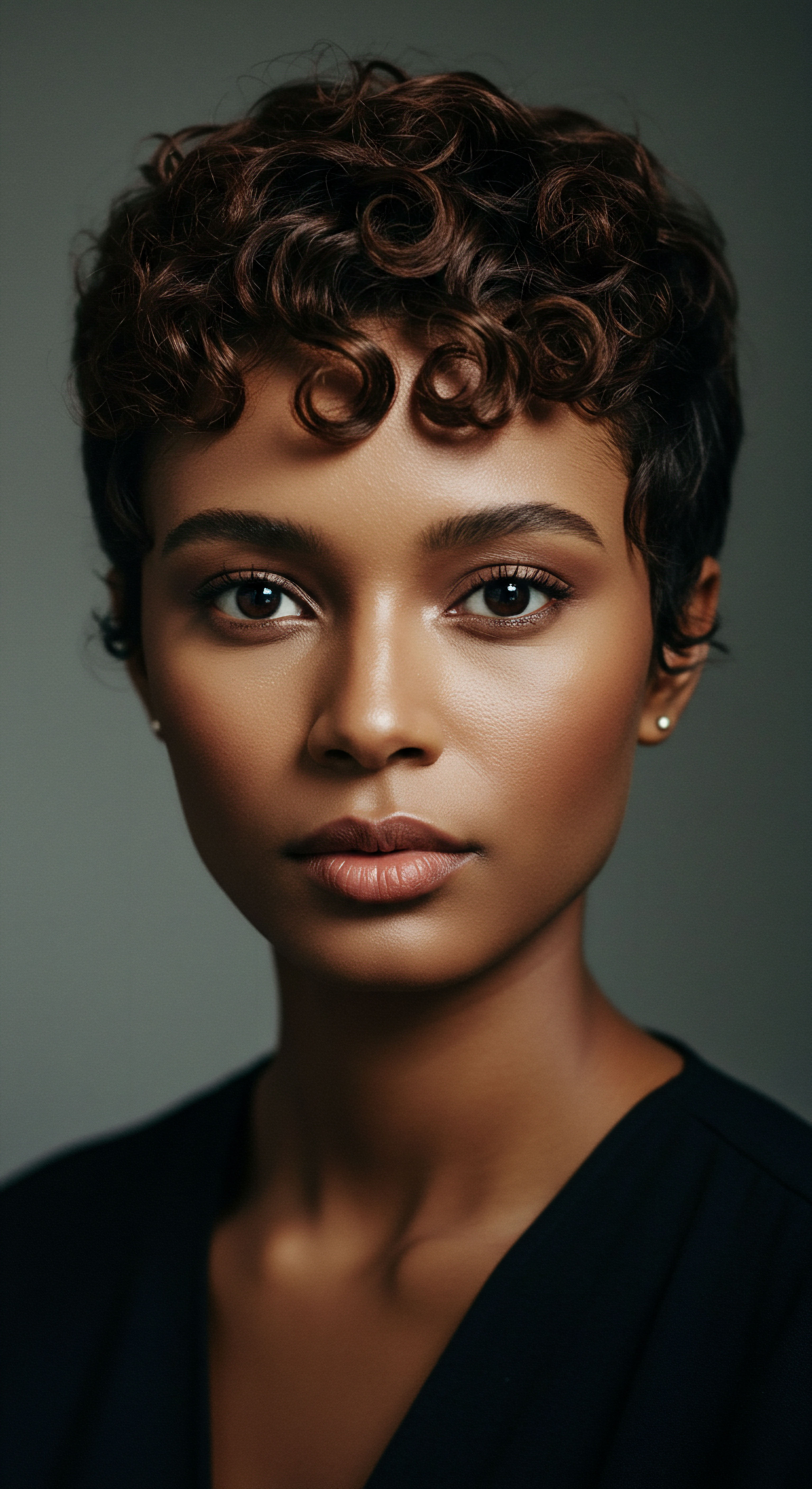
The Body’s Internal Clock and Hair Growth
Our bodies operate on a sophisticated internal timepiece, the Circadian Rhythm, which aligns physiological processes with the 24-hour cycle of day and night. This rhythm influences a myriad of bodily functions, from hormone secretion to cell regeneration. Intriguingly, hair follicles themselves possess their own functional circadian clock, regulating gene expression with an approximately 24-hour periodicity. Enhanced expression of circadian-clock-regulation genes occurs during the initiation of hair growth, specifically at the telogen and early anagen stages.
This biological clock coordinates cell cycle progression, influencing when hair cells divide and grow. For instance, a study using a mouse model found that the clock coordinates cell cycle progression, causing hairs to grow faster in the morning than in the evening. This highlights a profound, albeit often unseen, connection between our daily rhythms and the very mechanics of hair production. When our sleep patterns are disturbed, this internal clock can be thrown out of sync, potentially affecting the precise timing required for optimal hair growth and renewal.
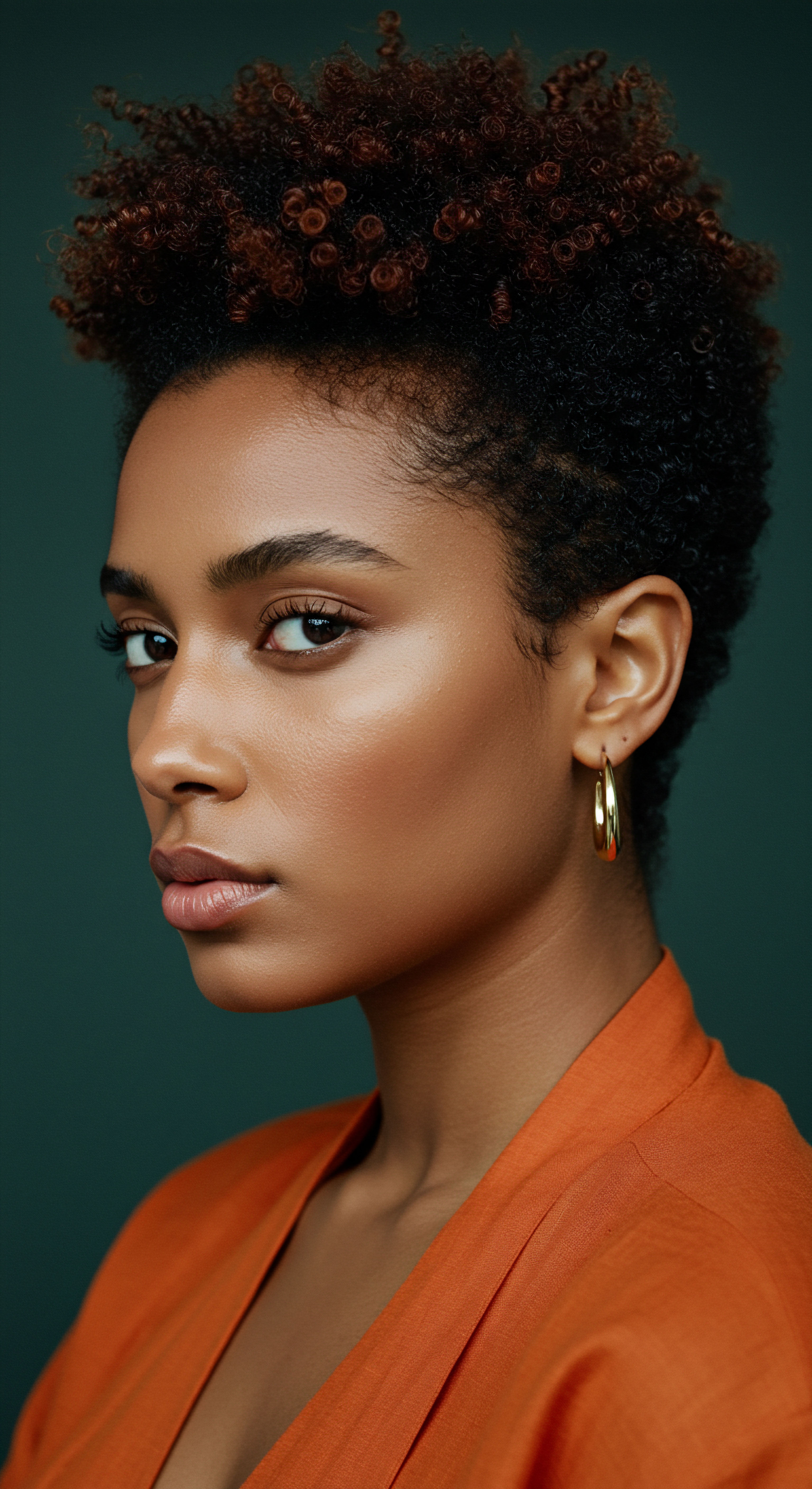
Hormonal Orchestration and Hair Health
Sleep plays a critical role in regulating various hormones that directly or indirectly influence hair health. Two primary hormones stand out in this intricate interplay ❉ Cortisol and Melatonin.
Cortisol, often termed the “stress hormone,” is naturally higher in the morning to promote wakefulness and decreases throughout the day, reaching its lowest point during deep sleep. When sleep is consistently poor or insufficient, cortisol levels can remain elevated. High cortisol levels have been associated with a condition called Telogen Effluvium, where hair follicles are prematurely pushed into the resting phase, leading to excessive shedding and thinning. Chronic stress, which is exacerbated by sleep deprivation, can contribute to this condition.
Conversely, Melatonin, the hormone that induces sleep, also appears to have a significant role within the hair follicle itself. Melatonin has receptors in hair follicles and helps regulate the hair growth cycle, particularly the anagen (growth) phase. It possesses antioxidant properties that may protect follicles from oxidative stress and stimulate cell growth.
Adequate sleep ensures proper melatonin production, supporting its beneficial effects on hair growth. A disruption in melatonin levels due to poor sleep can hinder hair growth and contribute to thinning.
The intricate relationship between sleep and these hormonal regulators forms a foundational layer of understanding. When the nightly symphony of our internal systems is disrupted, the delicate balance required for healthy hair growth can waver, leading to visible changes in hair thickness and density.
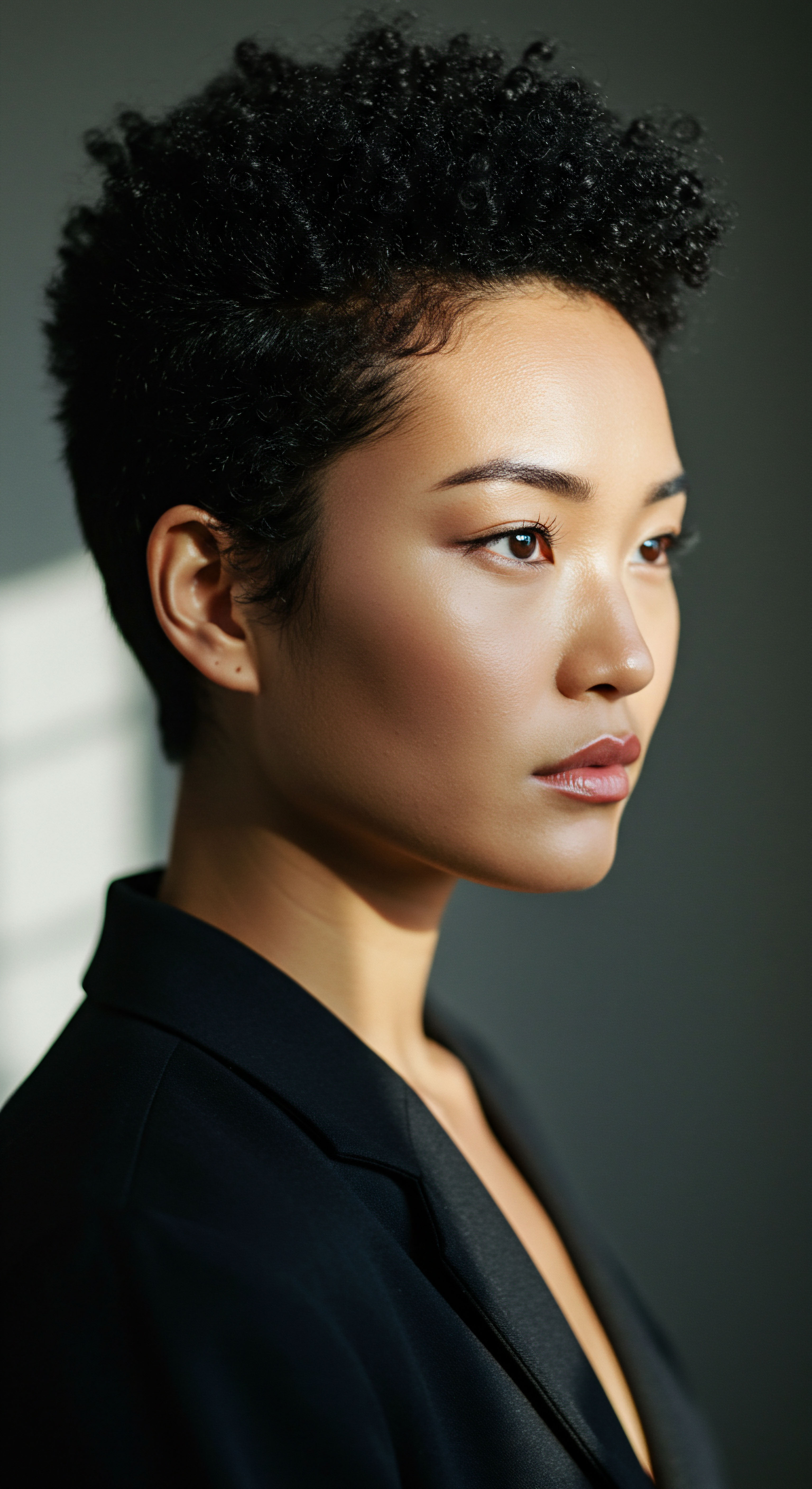
Ritual
Stepping from the quiet contemplation of hair’s foundational biology, we now consider the daily and nightly rhythms that shape our hair’s vitality. Our routines, both conscious and unconscious, create a landscape where hair either thrives or struggles. The question of how sleep impacts hair thickness shifts here from the unseen biological clock to the very tangible practices and choices that define our care. It is in the realm of ritual—from the way we prepare for rest to the gentle wisdom we apply to our strands—that we truly begin to see the practical implications of a night well spent, or one less so.
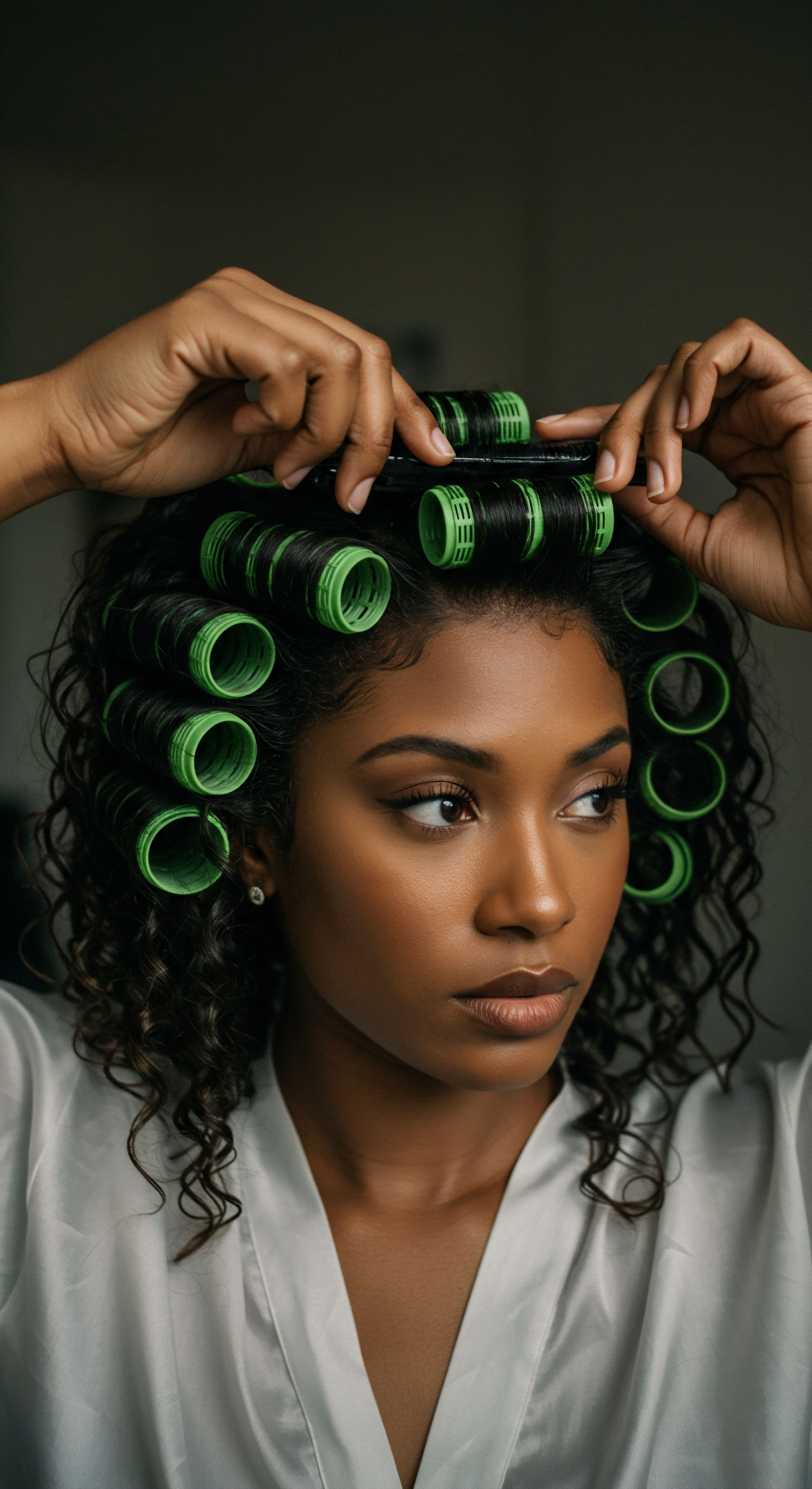
Sleep Quality and Hair Cycle Disruption
The quality of our sleep directly influences the hair growth cycle. During periods of deep, restorative sleep, the body performs essential repair and regeneration, including activities within the hair follicles. This is when cell turnover increases and growth hormones are released, supporting the active anagen phase of hair growth. When sleep is consistently disrupted, this vital nighttime restoration process is compromised.
Poor sleep can prematurely push hair follicles into the resting (telogen) phase, leading to increased shedding and noticeable thinning. This phenomenon, often referred to as Telogen Effluvium, is a common consequence of significant physical or emotional stress, which sleep deprivation undeniably contributes to. The hair cycle becomes asynchronous, with more hairs entering the shedding phase simultaneously rather than gradually.
Disrupted slumber can force hair follicles into an early resting state, interrupting their natural growth rhythm and leading to visible thinning.
A pharmacist noted that studies indicate people who regularly get less than six hours of sleep are 30% more likely to report issues with hair thinning. This highlights a direct statistical correlation between sleep duration and perceived hair health. The connection is not always immediate; a single restless night will not cause hair to fall out. However, prolonged sleep deprivation can certainly contribute to certain types of hair loss by creating an environment where follicles struggle to maintain their growth phase.

Circulation, Nutrients, and Scalp Health
Beyond hormonal regulation, sleep also plays a role in maintaining optimal blood circulation throughout the body, including the scalp. During deep sleep, blood flow to the scalp increases, delivering vital oxygen and nutrients to the hair follicles. This consistent supply of nourishment is crucial for healthy hair growth and the strength of each strand.
When sleep is insufficient, circulation can be impaired, limiting the delivery of these essential components to the follicles. This restricted blood flow can weaken hair strands, making them more prone to breakage and thinning over time. A healthy scalp environment is also foundational for robust hair. Sleep deprivation can lead to a dry, irritated scalp and weakened hair structure, further compromising hair health.
Consider the subtle signals our scalp sends ❉ a persistent itch, unusual dryness, or increased sensitivity. These can sometimes be quiet whispers of internal imbalance, perhaps stemming from a body that is not receiving its full measure of nighttime restoration.
| Mechanism Hormonal Balance (Cortisol) |
| Effect of Poor Sleep Elevated stress hormones |
| Hair Consequence Premature shedding, telogen effluvium |
| Mechanism Hormonal Balance (Melatonin) |
| Effect of Poor Sleep Reduced melatonin levels |
| Hair Consequence Disrupted growth cycle, hindered hair formation |
| Mechanism Blood Circulation |
| Effect of Poor Sleep Decreased blood flow to scalp |
| Hair Consequence Weakened follicles, reduced nutrient supply |
| Mechanism Cellular Regeneration |
| Effect of Poor Sleep Slowed repair processes |
| Hair Consequence Impaired hair follicle activity |
| Mechanism Understanding these pathways reveals how sleep underpins hair vitality. |

Nighttime Sanctuary and Hair Protection
For textured hair, nighttime care is a ritual of preservation. While sleep directly impacts internal biological processes, the external practices adopted before bed also play a significant part in maintaining hair thickness and health. Protecting strands from friction and tangling during sleep can prevent mechanical breakage, which might be mistakenly attributed solely to internal thinning.
- Silk or Satin Pillowcases ❉ These materials create less friction than cotton, reducing snagging and breakage, especially for delicate textured strands.
- Protective Styles ❉ Braids, twists, or pineapple styles help to contain hair, minimizing tangles and stress on the roots while sleeping.
- Bonnets or Wraps ❉ A satin-lined bonnet acts as a shield, guarding hair against moisture loss and friction, preserving style and length.
These external rituals, while not directly altering the hair growth cycle, support the physical integrity of the hair that is growing. When combined with adequate restorative sleep, they create a comprehensive approach to hair health, acknowledging both the unseen biological processes and the tangible need for physical care. The aim is to create an environment where hair can rest as peacefully as the body, allowing internal systems to perform their restorative duties without added external strain.
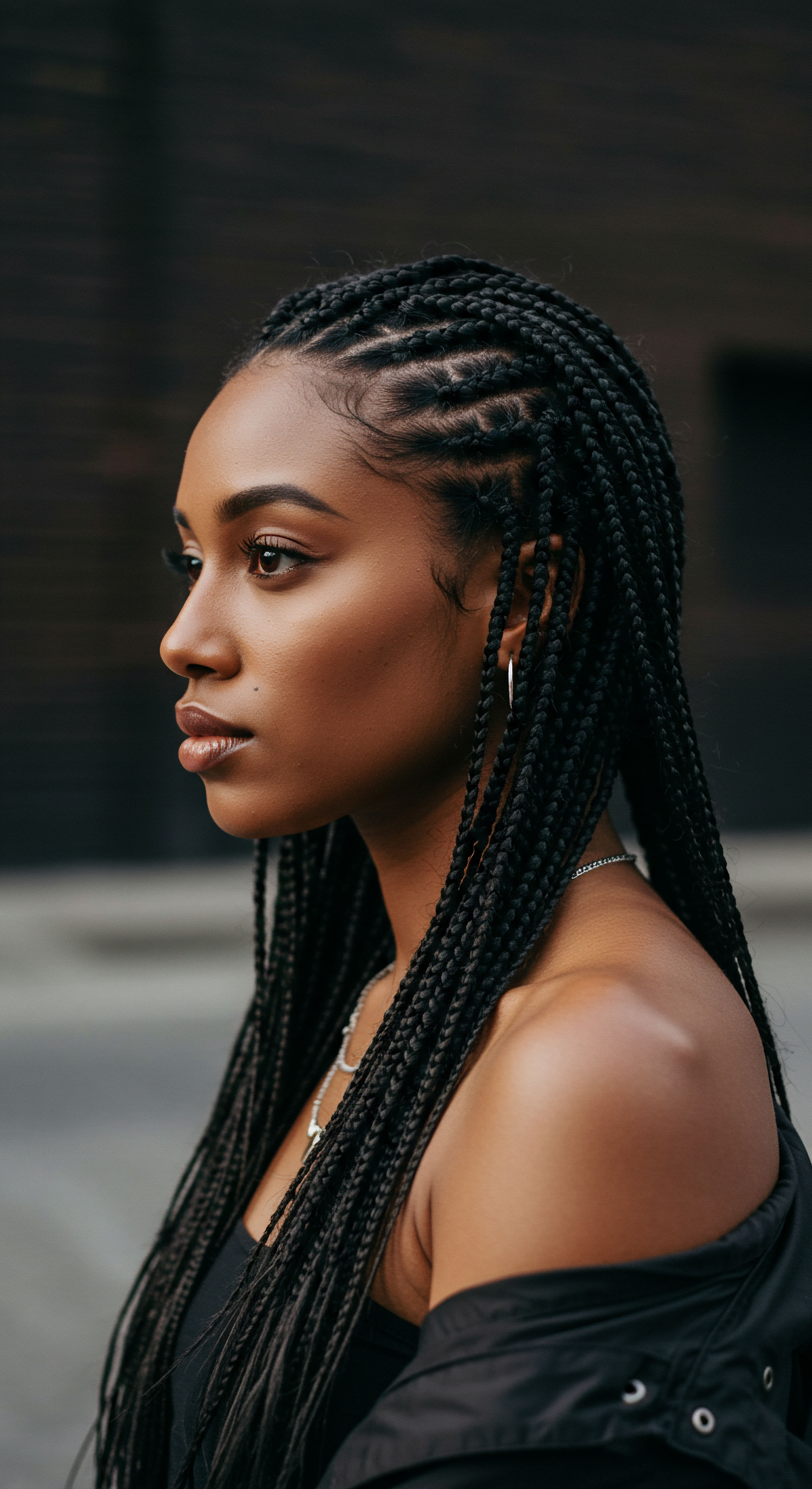
Relay
Having explored the fundamental connections and daily rituals, we now turn to a more profound exchange, a relay of influences where the complexities of sleep intertwine with the deeper currents of our well-being and, by extension, our hair. This is where the quiet signals of the body speak volumes, and where the lines between internal physiological states and external manifestations become clearer. The query about sleep and hair thickness expands here into a multi-dimensional consideration, inviting us to contemplate the subtle yet powerful dialogues happening within our systems, often beneath the surface of our daily awareness.

The Circadian Rhythm’s Silent Influence on Follicular Activity
The body’s internal clock, the Circadian Rhythm, orchestrates far more than just our sleep-wake cycles. It deeply influences cellular activity, including the regenerative processes within hair follicles. Research has revealed that specific “clock genes” are expressed in hair follicles, playing a role in regulating the hair growth cycle. These genes, such as BMAL1 and PER1, influence the timing of cell division and proliferation within the hair matrix.
Consider a study published in the journal PNAS, which demonstrated that the cell-autonomous circadian clock optimizes physiological regeneration of hair follicles by synchronizing mitotic progression in transient amplifying hair-matrix cells. This study found that a daily mitotic rhythm causes hairs to grow faster in the morning than in the evening. Furthermore, due to the high sensitivity of mitotic cells to radiation, significantly greater hair loss occurred in the morning than in the evening following exposure to the same dose of gamma-radiation. This highlights how deeply hair growth is tied to our internal clock and the vulnerability that arises when this timing is disrupted.
When our sleep patterns are erratic, the synchronization of these follicular clocks can falter. This desynchronization may not immediately lead to dramatic hair loss, but over time, it can contribute to a less efficient hair growth cycle, potentially resulting in thinner strands or a reduced density of new hair. The body’s ability to repair and regenerate is most active during deep sleep phases, and when these phases are consistently cut short or fragmented, the hair follicles are deprived of their optimal environment for robust growth.

Beyond Stress Hormones ❉ Immune System and Inflammation
While the link between sleep deprivation and elevated cortisol levels is well-documented, the impact extends further to the Immune System and inflammatory responses. Chronic lack of sleep can weaken the immune system, making the body more susceptible to inflammation. Inflammation around hair follicles can hinder their proper function, making it harder for them to grow new hair.
This is particularly pertinent in conditions like Alopecia Areata, an autoimmune disorder where the immune system mistakenly attacks hair follicles, leading to patchy hair loss. A cross-sectional study on sleep disturbance in alopecia areata patients found that sleep quality is indeed impaired in these individuals, and those with anxiety and depression (often linked to sleep issues) experienced more disturbed sleep. While the relationship can be reciprocal—hair loss causing stress and poor sleep, and poor sleep worsening the condition—it underscores the interconnectedness of sleep, immune function, and hair health. The study further suggested that sleep disorders, especially in those under 45, could be a predisposing factor for alopecia areata.
The connection is not always a direct line, but rather a complex interplay. When the body is under the systemic strain of inadequate rest, its defenses are lowered, and inflammatory pathways may become more active, potentially creating an environment less conducive to the robust health of hair follicles.
The intricate dance between sleep, our internal clock, and immune system health paints a compelling picture of how nightly rest shapes the very vitality of our hair.
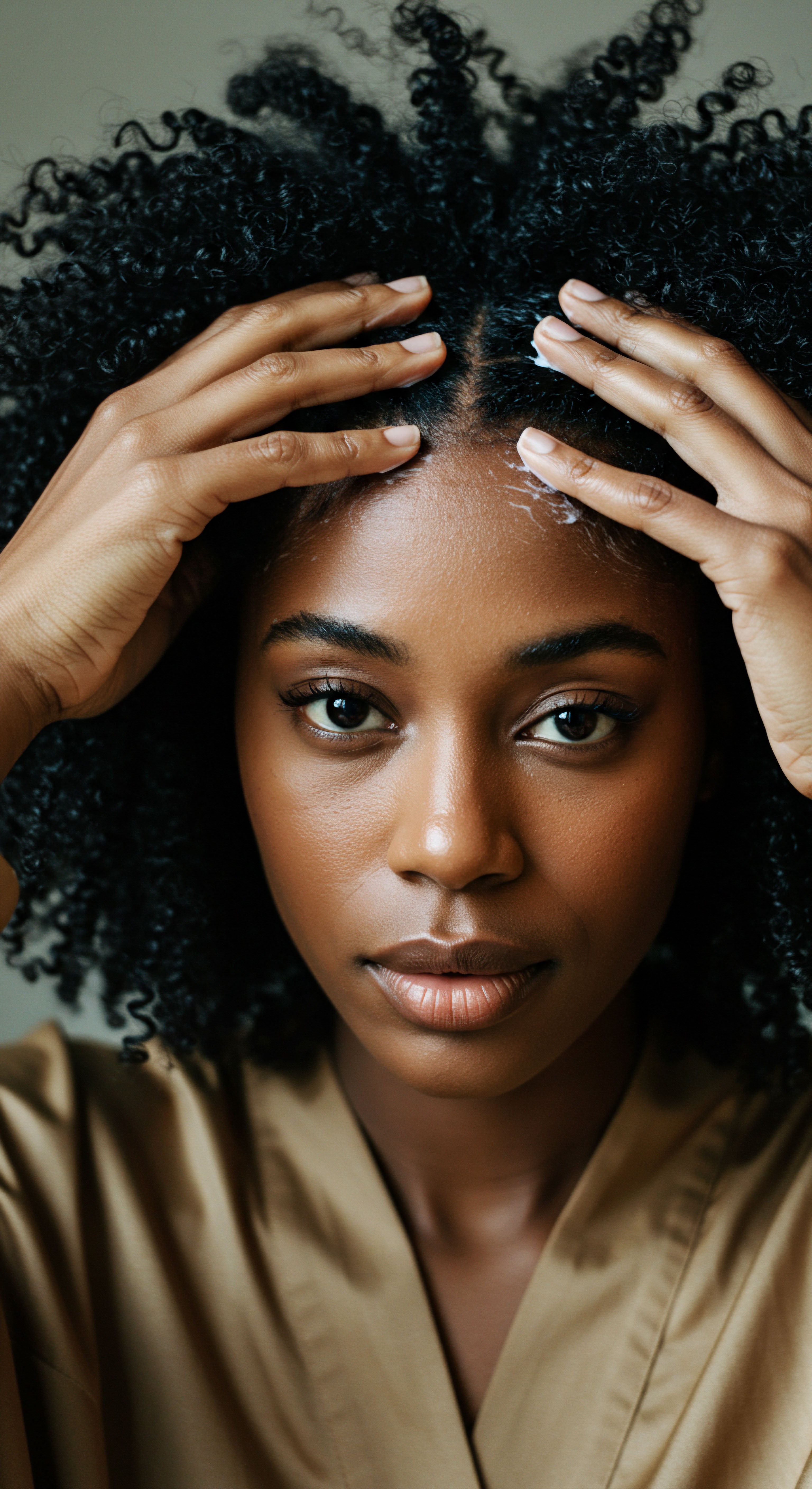
Nutritional Pathways and Hair Follicle Metabolism
Deep sleep is a period of significant cellular repair and metabolic regulation. During this time, the body optimizes nutrient delivery and utilization, which is crucial for the highly active metabolic demands of hair follicles. Hair growth is a protein-intensive process, and sufficient rest supports the protein synthesis required for keratin production, the primary protein component of hair.
A lack of quality sleep can compromise these metabolic processes, potentially leading to a suboptimal supply of building blocks for hair production. While direct studies quantifying the precise nutritional impact of sleep on hair thickness are still evolving, the foundational role of sleep in overall bodily repair and nutrient assimilation suggests a clear, albeit indirect, pathway. The body prioritizes essential functions during sleep, and when this prioritization is disrupted, systems with high metabolic turnover, like hair growth, may be affected.
Consider the impact on the production of various enzymes and proteins integral to hair follicle cell metabolism. Sleep facilitates the release of these elements, promoting cellular activity and structural keratin production. When this process is hindered, the hair shaft itself may become weaker, less resilient, and perceptibly thinner over time.
- Protein Synthesis ❉ Adequate sleep supports the body’s capacity to synthesize proteins, including keratin, which forms the structural foundation of hair.
- Growth Hormone Release ❉ Deep sleep triggers the release of growth hormone, which in turn influences insulin-like growth factors vital for hair keratin production.
- Nutrient Delivery ❉ Optimal sleep ensures robust blood flow, which carries essential vitamins, minerals, and amino acids to the hair follicles for their active growth.
This holistic view acknowledges that hair thickness is not merely a surface concern, but a reflection of a body working in harmonious balance, a balance profoundly influenced by the quality and consistency of our nightly rest.

Reflection
As we close this exploration into the intricate relationship between sleep and hair thickness, we are reminded that the journey of understanding our hair is a continuous one, deeply connected to the broader rhythms of our lives. The strands that crown us are not isolated entities; they are responsive, living extensions of our internal landscape. To consider the vitality of our hair is to consider the quality of our rest, the quiet symphony of our hormones, and the resilient dance of our cellular repair.
This understanding moves beyond simple cause and effect, inviting a deeper appreciation for the holistic interplay of well-being. It asks us to listen to the whispers of our body, to honor its need for replenishment, and to recognize that true radiance often begins in the gentle stillness of a restorative night.

References
- Lin, K. K. et al. (2013). Hair Follicles as a Critical Model for Monitoring the Circadian Clock. PLoS ONE, 8(1), e54722.
- Hair Doctors. (2025). Can Lack of Sleep Make You Lose Hair? Uncovering the Connection. Retrieved from Hair Doctors website.
- Centre Clauderer. (n.d.). Hair and sleep ❉ the importance of the night for hair health. Retrieved from Centre Clauderer website.
- HairFree & HairGrow. (2023). Sleep and Hair Loss. Relationship Explained. Retrieved from HairFree & HairGrow website.
- Clinikally. (2024). Impact of Sleep Deprivation on Hair Health. Retrieved from Clinikally website.
- Saeedi, M. et al. (2022). Sleep disturbance in alopecia areata ❉ A cross‐sectional study. Journal of Cosmetic Dermatology, 21(4), 1709-1714.
- Wimpole Clinic. (n.d.). Can Lack of Sleep Cause Hair Loss? Retrieved from Wimpole Clinic website.
- Yu, Y. et al. (2023). Melatonin’s Role in Hair Follicle Growth and Development ❉ A Cashmere Goat Perspective. International Journal of Molecular Sciences, 24(16), 12799.
- MONPURE. (2024). Hair Loss ❉ Is Lack of Sleep Stunting Growth? Retrieved from MONPURE website.
- Skolnick, M. et al. (2020). Hair Cortisol Concentration as a Biomarker of Sleep Quality and Related Disorders. International Journal of Environmental Research and Public Health, 17(19), 7084.
- HHC Clinics. (2025). Sleep and Hair Growth – What’s the Connection? Retrieved from HHC Clinics website.
- Treatment Rooms London. (2024). Can A Lack of Sleep Cause Hair Loss? Retrieved from Treatment Rooms London website.
- LearnSkin. (2017). How Does the Circadian Rhythm Affect Hair Growth? Retrieved from LearnSkin website.
- The Hairy Pill. (n.d.). Does Lack of Sleep Cause Hair Loss? Retrieved from The Hairy Pill website.
- Limmer Hair Transplant Center. (2025). Can Lack of Sleep Cause Hair Loss? Retrieved from Limmer Hair Transplant Center website.
- DiStefano Hair Restoration Center. (2025). Does Sleep Affect Hair Health? Retrieved from DiStefano Hair Restoration Center website.
- Plikus, M. V. et al. (2010). Clock genes, hair growth and aging. Aging (Albany NY), 2(3), 164-167.
- Geyfman, M. et al. (2013). Local circadian clock gates cell cycle progression of transient amplifying cells during regenerative hair cycling. Proceedings of the National Academy of Sciences, 110(23), 9521-9526.
- Li, M. et al. (2023). Melatonin regulates the periodic growth of secondary hair follicles through the nuclear receptor RORα. Frontiers in Physiology, 14, 1163470.
- Gro Clinics. (n.d.). Can Lack of Sleep Cause Hair Loss? Retrieved from Gro Clinics website.
- Hairguard. (2024). Melatonin for Hair Loss & Growth, Here’s Everything You Need to Know. Retrieved from Hairguard website.
- Healthline. (2024). Does Melatonin Cause Hair Loss? What Research Shows. Retrieved from Healthline website.
- Her.ie. (2025). Pharmacist explains how poor sleep can lead to hair loss. Retrieved from Her.ie website.
- Glaser, L. A. et al. (2023). Melatonin and the Human Hair Follicle. Journal of Drugs in Dermatology, 22(3), 294-297.
- Good Health by Hims. (2024). Does Lack of Sleep Cause Hair Loss? Retrieved from Good Health by Hims website.
- Dr Serkan Aygin Clinic. (2022). Do Your Sleeping Habits Affect Your Hair Loss? Retrieved from Dr Serkan Aygin Clinic website.
- Cleveland Clinic. (2022). Telogen Effluvium ❉ Symptoms, Causes, Treatment & Regrowth. Retrieved from Cleveland Clinic website.
- Harley Street Hair Clinic. (n.d.). Emotional stress and hair loss. Retrieved from Harley Street Hair Clinic website.
- Sleep Centers of Middle Tennessee. (2021). Can Sleep Apnea Cause Hair Loss? Retrieved from Sleep Centers of Middle Tennessee website.
- HCPLive. (2025). Hair, Scalp Health Linked to Perceived Stress and Sleep Quality. Retrieved from HCPLive website.